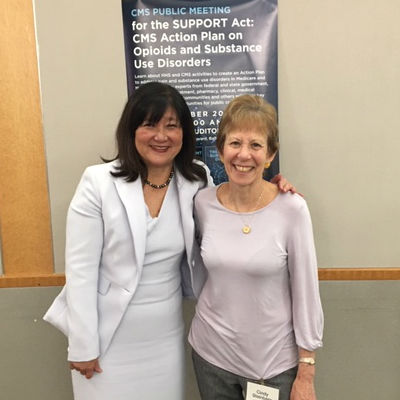
Shari Ling, MD, Deputy Chief Medical Officer of CMS, left, with Steinberg
The Center for Medicare and Medicaid Services (CMS) convened a public meeting on Sept. 20 to solicit input into the development of an Action Plan on the opioid crisis and the treatment of acute and chronic pain as specified in the SUPPORT Act. The Action Plan is due to Congress June 1, 2020.
Cindy Steinberg, National Director of Policy and Advocacy, was among the meeting’s speakers as a member of a panel, “Personal Perspectives on Pain and Substance Use Disorders.” To read about her comments on the panel, click here.
The meeting was kicked off by Department of Health and Human Services Assistant Secretary for Health, Admiral Brett Giroir, MD, the official in charge of the nation’s response to the opioid crisis. Admiral Giroir gave an overview of the administration’s five-point strategy, a report on progress to-date, and discussed some promising new directions for future work. Notably, he acknowledged the inadequacy of pain care in the United States, stating “If we do not solve the pain crisis, we will not solve the opioid crisis.”
[su_pullquote align=”right”]Read more about Steinberg’s comments on the panel here.[/su_pullquote]
There were numerous panel discussions throughout the day looking at various aspects of pain management and substance use disorders from the perspectives of federal agencies (i.e. the Food & Drug Administration, the Centers for Disease Control and Prevention, and the National Institutes of Health), special populations (i.e. veterans, minorities), innovative approaches, and industry. Each panel included suggestions for how Medicare and Medicaid could alter their policies to improve access to pain and substance use disorder treatment for beneficiaries.
CMS has opened a Request for Information (RFI) here. Comments must be received by 5 pm EST on Oct. 11. U.S. Pain Foundation will be submitting a letter and encourages people with pain to write in with their recommendations on how CMS should modify their payment and coverage policies to improve access to pain care.
“I am optimistic that CMS is listening to stakeholders and wants to increase options and remove barriers to pain management therapies,” says Steinberg. “I urge people with pain to write in to CMS’s RFI telling them what would be most beneficial to you from a Medicare and/or Medicaid payment and coverage standpoint. Congress has created this opportunity for people with pain. Now we have to take advantage of it—because these opportunities do not come along very often.”
